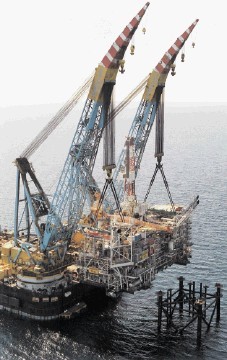
RWE Dea’s gas production boss has called for a return to the CRINE cost-cutting principles of the 1990s after facing major project delays and cost increases.
Paul Jeffs, head of production and exploration at RWE Dea UK, outlined a series of delays, rig availability issues and cost overruns on the firm’s Breagh and Clipper South projects in the southern North Sea (SNS).
Recent figures released by its partner on Breagh, Sterling Resources (30% owner) showed costs had gone up 17% on the project, from £485million to £566million.
This, it said, was due to a delayed start on pipeline installation and harder-than-expected trenching conditions. Development drilling costs had also added to the cost increase and onshore plant equipment had been damaged during shipping.
RWE also had issues agreeing onshore pipeline routes, said Jeffs, speaking at the 2012 Southern North Sea Conference, run by EEEGr, having to deal with 22 land owners and having to replant 22 different types of grass in one area.
He said there were also increasing contractual difficulties. Simplicity brought in under the 1990s CRINE (Cost Reduction Initiative for the New Era) initiative had now been eroded and contracts were now becoming increasingly adversarial, he said.
These issues were making business in the basin unattractive when compared to 30trillion cu.ft gas finds off Mozambique, he added.
“Cost overruns and lateness undermine our product,” he said. “Costs of gas fields are growing to a level where the southern North Sea is becoming unattractive.
“Let’s bring back some standardisation initiatives to get come costs under control. We are squabbling over slices of the cake when the whole cake is shrinking. We should be looking at the whole cake not our own sales.”
He said costs on one contract had risen 27%, with additional costs rising 46% on top of that.
However, the CRINE initiative, which focussed on cutting capital costs, has had its critics, with complaints that the cost-cutting has led to later life issues with infrastructure.
Other issues facing operators were delays on drilling due to rigs being delayed on previous projects and general tightness in the rig market.
“You can’t get a rig,” said Jeffs. “There are none available until 2014. They have gone to other markets. That delay affects our business. It affects our sustainability.”
Last year, the firm installed platforms on its operated Clipper South and Breagh fields, both due on stream from summer.
Drilling started in February on Clipper South, which has 500billion cu.ft in place, and it is due to start on Breagh as part of the first phase of development.
RWE has also faced delays on Clipper South, where it is drilling three 1,600m (5,000ft) long horizontal wells and using multi-fracturing to access tight gas in low permeability rock.
The project was also delayed – six months – due to pipelaying being behind and the rig was three months late.